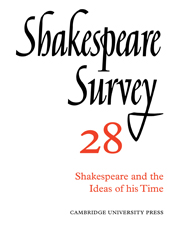Book contents
- Frontmatter
- ‘Richard II’ and the Realities of Power
- The Politics of Corruption in Shakespeare’s England
- Literature without Philosophy: ‘Antony and Cleopatra’
- Self-consciousness in Montaigne and Shakespeare
- ‘Measure for Measure’: The Bed-trick
- Shakespeare and the Doctrine of the Unity of Time
- ‘Coriolanus’ and the Body Politic
- ‘Titus Andronicus’, iii, i, 298–9
- ‘The Merchant of Venice’ and the Pattern of Romantic Comedy
- The Integrity of ‘Measure for Measure’
- ‘To Say One’: An Essay on ‘Hamlet’
- ‘The Tempest’ and King James’s ‘Daemonologie’
- Sight-lines in a Conjectural Reconstruction of an Elizabethan Playhouse
- The Smallest Season: The Royal Shakespeare Company at Stratford in 1974
- The Year's Contributions to Shakespearian Study 1 Critical Studies
- 2 Shakespeare’s Life, Times, and Stage
- 3 Textual Studies
- Index
- Plate section
Self-consciousness in Montaigne and Shakespeare
Published online by Cambridge University Press: 28 March 2007
- Frontmatter
- ‘Richard II’ and the Realities of Power
- The Politics of Corruption in Shakespeare’s England
- Literature without Philosophy: ‘Antony and Cleopatra’
- Self-consciousness in Montaigne and Shakespeare
- ‘Measure for Measure’: The Bed-trick
- Shakespeare and the Doctrine of the Unity of Time
- ‘Coriolanus’ and the Body Politic
- ‘Titus Andronicus’, iii, i, 298–9
- ‘The Merchant of Venice’ and the Pattern of Romantic Comedy
- The Integrity of ‘Measure for Measure’
- ‘To Say One’: An Essay on ‘Hamlet’
- ‘The Tempest’ and King James’s ‘Daemonologie’
- Sight-lines in a Conjectural Reconstruction of an Elizabethan Playhouse
- The Smallest Season: The Royal Shakespeare Company at Stratford in 1974
- The Year's Contributions to Shakespearian Study 1 Critical Studies
- 2 Shakespeare’s Life, Times, and Stage
- 3 Textual Studies
- Index
- Plate section
Summary
The encounter of two master-minds is always impressive, but after surveying the collected evidence for the influence of Montaigne upon Shakespeare, I came to the conclusion that I could not break fresh ground in the field of source-hunting and that the assessment of Shakespeare’s alleged debt only required the exercise of judgement – an unexciting prospect. I therefore rapidly turned from the sifting of parallels to a broader consideration of the ways in which the minds of the French essayist and the English dramatist had worked in self-scrutiny. This was bound to be a study in modes of self-awareness, not in self-revelation since I could not pretend to trace Shakespeare’s elusive self. My present interest is not in the contents but in the forms of self-consciousness; not in ideas but in faculties of the mind. Ideas in a play need not belong to the author nor even be seriously entertained by him. But no character can be invested with mental faculties not possessed by his creator.
When you compare minds rather than ideas, proof of influence is unattainable. Besides, the gradual development of self-consciousness in Shakespearian drama certainly did not originate in the reading of Montaigne. However, if it could be proved that an acquaintance with the Essays preceded the writing or rewriting of Hamlet, it might account for the heightening and refinement of self-analysis in this tragedy and some of the next plays.
- Type
- Chapter
- Information
- Shakespeare Survey , pp. 37 - 50Publisher: Cambridge University PressPrint publication year: 1975
- 9
- Cited by

